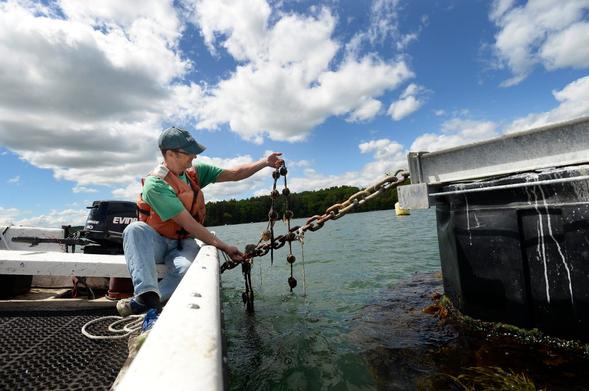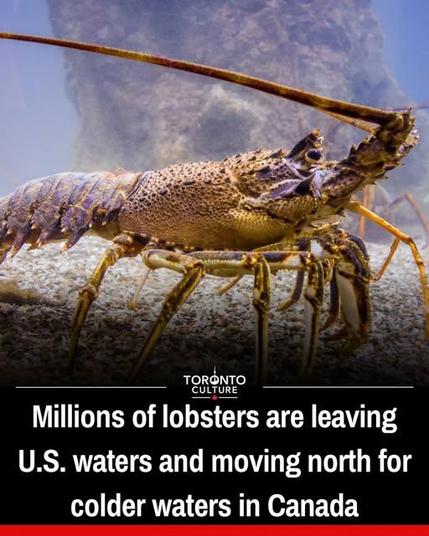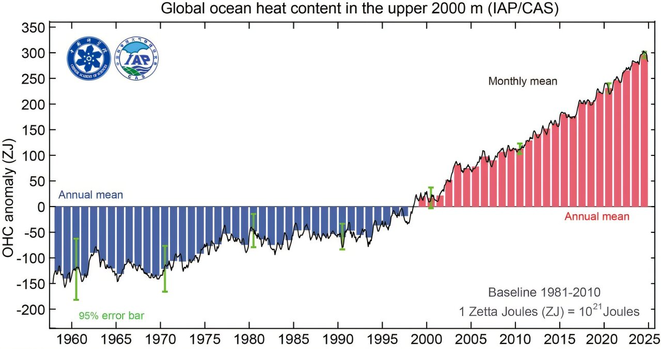#Wildfires, including the #EatonFire & #PalisadesFire, have significant repercussions on #marine #ecosystems. The ash & debris from these fires can enter waterways & eventually the #ocean, altering nutrient levels & fostering conditions favorable to the growth of harmful #AlgalBlooms. The #toxic byproducts from these fires can exacerbate #OceanWarming, further promoting the frequency of these toxic blooms. This can lead to increased production of #DomoicAcid.
#oceanwarming
#Crisis On The Coast: #DomoicAcid Poisoning Strands 140 #SeaLions & 50 #Dolphins On #California Beaches
The recent influx of #marine #wildlife affected by domoic acid poisoning off the coast of Southern California underscores a critical #environmental crisis, w/≧140 sea lions suffering from this debilitating poison & reports of at least 50 stranded dolphins along local beaches.
#ClimateCrisis #climate #MarineLife #ocean #wildfires #ecosystems #algae #OceanWarming #science
https://worldanimalnews.com/crisis-on-the-coast-domoic-acid-poisoning-strands-140-sea-lions-and-50-dolphins-on-california-beaches/
From #Himalaya to #Arctic - #GlaciersAtRisk: A Wake-Up Call on #WorldWaterDay
Story by Namrata Dadwal, March 21, 2025
"This year on World Water Day on March 22, the UN is highlighting '#GlacierPreservation'. Why? Because these frozen reservoirs that supply freshwater to nearly two billion people are disappearing at an alarming rate due to #ClimateChange.
"According to the #Copernicus Climate Change Service (#C3S), Earth's #glaciers have lost over 8,200 gigatonnes of ice since 1976, leading to #RisingSeaLevels and #WaterScarcity concerns. Nearly 6,000 gigatonnes were lost between 2000 and 2023, with the 2010s being the worst decade on record for glaciers almost the annual ice loss was more than double that of the 1980s, with an average of 370 gigatonnes of ice vanishing each year."
Read more:
https://www.msn.com/en-in/news/India/from-himalaya-to-arctic-glaciers-at-risk-a-wake-up-call-on-world-water-day/ar-AA1Bqrlg
#WaterSecurity #WaterIsLife #OceanWarming #OceansAreLife
State of the Global Climate 2024
Key messages:
Key #ClimateChange indicators again reach record levels
Long-term #warming (averaged over decades) remains below 1.5°C
#SeaLevelRise and #OceanWarming #irreversible for hundreds of years
Record #GreenhouseGas concentrations combined with #ElNiño and other factors to drive 2024 record heat
Early warnings and #climate services are vital to protect communities and economies
The clear signs of human-induced climate change reached new heights in 2024, which was likely the first calendar year to be more than 1.5°C above the pre-industrial era, with a global mean near-surface temperature of 1.55 ± 0.13 °C above the 1850-1900 average.
https://wmo.int/publication-series/state-of-global-climate-2024

Even the lobsters are leaving the U.S. ...
Lobsters are migrating north to Canada as the Gulf of Maine becomes one of the fastest-warming ocean territories in the world.
Maine, which produces 93 percent of the U.S. lobster supply, has seen annual catch numbers drop from 50 million kg in 2021 to 39 million kg in 2024.
The Gulf of Maine is heating up 3x faster than other ocean waters, pushing lobsters into Canada’s cooler waters and reshaping the industry.
#ClimateChange #Lobster #OceanWarming
Firings at US #weather and #oceans agency risk lives and economy, former agency heads warn
By SETH BORENSTEIN
Updated 9:48 AM EST, March 1, 2025
WASHINGTON (AP) — "The federal weather and oceans agency touches people’s daily lives in unnoticed ways, so massive firings there will likely cause needless deaths and a big hit to America’s economy, according to the people who ran it.
"The first round of firings started Thursday at the National Oceanic and Atmospheric Administration, a government agency that monitors the oceans, the atmosphere where storms roam and space, and puts out hundreds of 'products' daily. Those products generally save lives and money, experts say.
"#NOAA’s 301 billion weather forecasts every year reach 96% of American households.
The firings are 'going to affect safety of flight, safety of shipping, safety of everyday Americans,' Admiral Tim Gallaudet told The Associated Press Friday. President Donald Trump appointed Gallaudet as acting NOAA chief during his last administration. 'Lives are at risk for sure.'
"Former NOAA Administrator Rick Spinrad agreed.
"'We’re getting into prime #tornado time. We’re getting into #planting season for the agricultural season for the bread belt,' Spinrad said. 'It’s going to affect safety. It’s going to affect the economy.'"
https://apnews.com/article/noaa-doge-federal-cuts-musk-weather-danger-6f60e7c511989aeff8930ae87c9a5ee8
#USPol #ClimateChange #ClimateCrisis #PolyCrisis #HungerGames #FoodInsecurity #WeatherForecasts #ExtremeWeather #Safety #Spaceweather #SolarFlares #ClimateScientists #OceanWarming #Oceanographers #BadDOGE

Grrrr... More #retaliation because of #Maine's #resistance?!
#MaineSeaGrant in jeopardy after #Trump administration terminates $4.5 million grant program
The move to discontinue the four-year agreement — which comes amid the White House's efforts to slash the National Oceanic and Atmospheric Administration's budget — leaves the fishery organization’s programming and 20 employees in limbo.
https://www.pressherald.com/2025/03/01/maine-sea-grant-funding-terminated-as-trump-administration-makes-cuts-to-noaa/
#USPol #MaineSeaGrant #ClimateChange #OceanWarming #ResistIgnorance #ResistFascism #TrumpMustGo #MainePol #District13 #SeeYouInCourt #MaineResists

Shocking Fourfold Spike in Ocean Warming Sparks Global Concern…
This rapid rise in #temperatures is linked to a growing energy imbalance in the Earth’s system, intensified by human-induced greenhouse gas emissions... #oceanwarming #greenhousegases #earthscience #elnino #oceanography #globalwarming

Finally, an answer to why Earth’s oceans have been on a record hot streak
A new study finds that the rate of ocean warming has more than quadrupled over the past 40 years — and pinpoints why.
by Sachi Kitajima Mulkey, January 28, 2025
"By looking back through satellite observations since 1985 and developing a statistical model that isolated the trends in both ocean warming and Earth’s energy imbalance, the researchers found they were escalating in lockstep. According to Merchant, the study is possibly the first to connect the two phenomena over recent decades. 'It’s a very tight correlation,' [Christopher Merchant, climate scientist] said.
"This relationship is bad news for the oceans, which have absorbed some 90 percent of the excess warming from human activity. Some of that heat will continue to seep down into the planet’s depths, while some will cycle back up toward the surface and escape into the atmosphere. According to the study, the next 20 years could warm up the oceans more than the last 40.
"If you think of the oceans as a bath, Merchant says, it’s like the hot tap was only a trickle in the 1980s — but now, it’s been cranked up. 'And what’s turning the tap more open, making the warming pick up speed, is an increase in#GreenhouseGases — #CarbonDioxide and #methane — which are both still rising, largely from the #FossilFuel industry,' he said.
"There are other factors turning up the heat. The El Niño pattern that began in 2023 added around 0.1 or 0.2 degrees Celsius, before the inverse La Niña pattern took over in December 2024.
"Another piece of the puzzle is the planet’s diminishing reflectivity, according to Brian McNoldy, an atmospheric scientist at the University of Miami’s Rosenstiel School of Marine, Atmospheric, and Earth Science. The ocean’s dark surface helps it absorb heat, whereas white clouds and aerosol particles in the atmosphere help bounce the sun’s radiation back into space. In 2020, the International Maritime Organization adopted a new rule to cut back on sulfur pollution from shipping fuel, but because the aerosol particles in emissions acted as a seed for clouds, the regulation had the unintended effect of dimming the marine layer of clouds that blanket the ocean.
"'So you get rid of a lot of those, and now more of the sun’s energy can be absorbed in the ocean instead of reflecting off clouds,' McNoldy said. According to Merchant, efforts to curb air pollution from factories in countries like China also had the side effect of cutting back reflective aerosols.
"The excess ocean warmth has had wide-ranging consequences. In April 2024, as the oceans started simmering, 77 percent of the world’s coral reefs became imperiled in the most extensive bleaching event on record, threatening the livelihoods of a billion people and a quarter of marine life. Changing ocean temperatures also shift weather patterns, potentially intensifying droughts, downpours, and storms alike.
"'Hurricanes love warmer water. So all other things be equal, a warmer ocean can produce stronger hurricanes with maybe more frequent instances of rapid intensification,' McNoldy said. Last September, Hurricane Helene slammed into Florida’s Gulf Coast after surging from a Category 1 to a Category 4 storm in a single day.
"'The oceans really set the pace for global warming for the Earth as a whole,' Merchant said. The knock-on effects — like wildfires, drought, and floods — will continue to escalate, too. 'That really needs to be understood, but it also needs to filter through to governments that changes might be coming down the line faster than they’re currently assuming.”"
Read more:
https://grist.org/oceans/why-earth-oceans-record-hot-streak/?utm_source=firefox-newtab-en-us
#ClimateCrisis #OceanWarming #BigOilAndGas #ClimateCatastrophe

Ocean Warming Has More Than Quadrupled Since 1980, Scientists Say https://www.byteseu.com/697691/ #Climate #ClimateChange #ClimateChangeResearch #GlobalWarming #OceanWarming #OceanWarmingResearch
https://www.europesays.com/1807095/ Ocean Warming Has More Than Quadrupled Since 1980, Scientists Say #Climate #ClimateChange #ClimateChangeResearch #GlobalWarming #OceanWarming #OceanWarmingResearch
Scientists Sound Alarm: Oceans Hit Record High Temperatures, Threatening Life on Land | SciTechDaily…
A recent study reveals that #oceanwarming in 2024 has set new record-high #temperatures. This marks the hottest conditions ever recorded by humans, … Scientists Sound Alarm: Oceans Hit Record High Temperatures, Threatening Life on Land | SciTechDaily…

Scientists Sound Alarm: Oceans Hit Record High Temperatures, Threatening Life on Land | SciTechDaily…
A recent study reveals that #oceanwarming in 2024 has set new record-high #temperatures. This marks the hottest conditions ever recorded by humans, affecting not only surface temperatures but also the upper 2,000 meters of the ocean... #climatechange #globalwarming #oceanography

Ocean temperatures hit record highs in 2024
A study published in Advances in Atmospheric Sciences has found that ocean warming in 2024 has led to new record high temperatures. The ocean is the hottest it has ever been recorded by humans, not only at the surface temperature but also for the upper 2000 meters..
"From a statistical standpoint, then, #scientists cannot exclude the possibility that the 2023-2024 record #oceanwarming resulted simply from the “usual” warming trend that humans have set the #planet on for the past 50 years. A very strong #ElNiño contributed some natural variability." 1/2
2024’s extreme ocean heat leaves 2 mysteries to solve
https://theconversation.com/2024s-extreme-ocean-heat-leaves-2-mysteries-to-solve-246843

Ocean warming drives immediate mass loss from calving glaciers in the high Arctic #oceanwarming #oceans #arctic #globalwarming https://www.nature.com/articles/s41467-024-54825-7?utm_source=cbnewsletter
Key Atlantic current could collapse soon, 'impacting the entire world for centuries to come,' leading climate scientists warn
“The science is clear that the climate crisis, driven by the continued expansion of fossil fuels, is causing weather events like this one to be more frequent and more intense. Data have shown that the damage caused by hurricanes can be exacerbated by warmer ocean temperatures caused by climate change and the associated sea level rise.”
#ClimateCrisis #ClimateChange #HurricaneHelene #ClimateAction #ClimateActionNow #ClimateScience #OceanWarming #ClimatePolitics
https://www.commondreams.org/newswire/hurricane-helene-is-the-climate-crisis-in-action
That is an INSANE amount of water.
“That’s enough to fill the Dallas Cowboys’ stadium 51,000 times, or Lake Tahoe just once. If it was concentrated just on the state of North Carolina that much water would be 3.5 feet deep (more than 1 meter). It’s enough to fill more than 60 million Olympic-size swimming pools.”
#HurricaneHelene #ClimateCrisis #ClimateAction #ClimateActionNow #Flooding #OceanWarming






